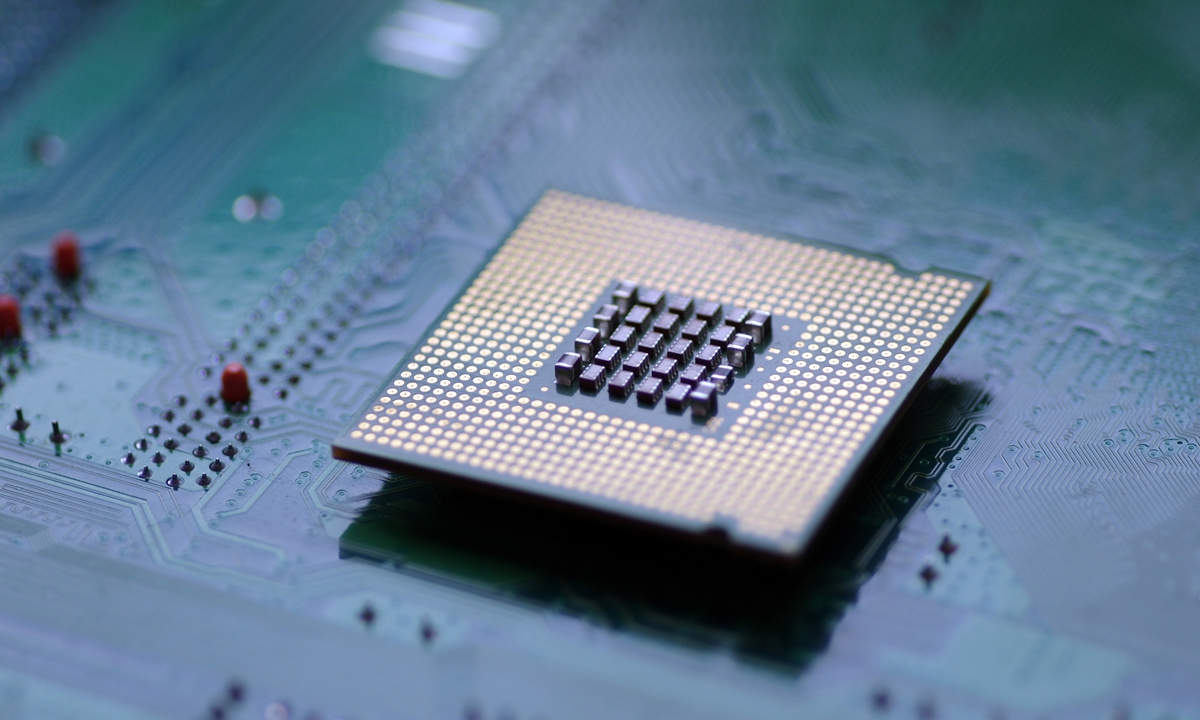Warnings after failure of Wuhan chip project
By Zhang Hongpei and Li Xuanmin Source: Global Times Published: 2020/9/7 20:53:42
Technology drive requires rational investment, top-down design

chip Photo:VCG
Amid industry zeal for technology advances in China's semiconductor sector, it is time to call for rational investment and top-down design by the government to avoid "expensive" failures, analysts told the Global Times on Monday.
The comments came as it emerged that a major chipmaking project of Wuhan Hongxin Semiconductor Manufacturing Co (HSMC), based in Wuhan, Hubei Province, has ground to a halt and may be abandoned for lack of funds.
HSMC, founded in November 2017, planned to make wafers with advanced logic technology in sizes of 7 nanometers and 14 nanometers. Each of the production lines was expected to make 30,000 pieces per month. The plan also called for a wafer-level advanced packaging production line.
According to Qixinbao, a database of Chinese enterprise information, HSMC's largest shareholder is Beijing Guangliang Lantu Technology Co, with a 90-percent stake. Founder and chairman Li Xueyan reportedly has no semiconductor experience, and the actual paid-up capital is zero.
The remaining 10 percent was held by an investment group affiliated with Wuhan's Linkong Port Economic and Technological Development Zone. The latter investor is state-owned and backed by the province.
Domestic news outlet Caixin reported in November 2019 that the project ground to a halt after a local court suspended the company's land-use rights.
According to the "Wuhan Major Project Plan in 2020" released by the city government in April this year, the HSMC project ranked No.1 among all projects with the highest investment value of a total of 128 billion yuan ($18.7 billion). As of the end of 2019, it had completed an investment of 15.3 billion yuan, and the investment in 2020 was expected to be 8.7 billion yuan.
The project flopped due to shortfalls of cash and technology, said an industry analyst.
The US' "under-the-table" moves and the fallout of the pandemic have cast shadows on the industry's sales prospects, Ma Jihua, a veteran industry analyst, told the Global Times on Monday.
"The US conspiracy has made it difficult for Chinese companies to secure equipment that is critical to chip manufacturing. For example, the delivery of a chip-making machine, a lithography machine, could be delayed," Ma said.
Industry observers said that China's chip industry, in particular ongoing projects, have often experienced similar misstep as the Wuhan situation.
An investment manager in the high-tech industry, who asked to remain anonymous, told the Global Times on Monday that the valuation of chip-related start-ups has risen amid industry hype, which is not a good sign.
The manager mentioned that "start-ups related to Huawei chip businesses have become very expensive."
"It is high time to call for rational deliberation in investing in the sector or the industry will veer off to the wrong path," he stressed.
China is striving to build an independent semiconductor industry that can supply major telecom giants such as Huawei, which was put onto a US trade blacklist by the Trump administration in May 2019 to block US firms from selling it components.
The US crackdown on Huawei further tightened in August, aimed at preventing the Chinese tech giant from obtaining semiconductors without a special license - including chips made by foreign firms that have been developed or produced with US technology.
"Some don't know what to do next under the US' malicious crackdown. Others are either re-evaluating the market or re-directing the focus of research and development," Ma noted.
Ma said that investing in the semiconductor industry requires a lot of money, while also being very risky. The Global Times learned last week that China has included developing the third-generation semiconductor industry into its 14th Five-Year Plan (2021-25).
"Top-down design will coordinate every 'player' in a harmonious way to achieve maximum benefit. It could also reduce the risk of making individual investments and attract more capital," Ma said.
Pan Helin, executive director with the digital economy research institute under Zhongnan University of Economics and Law, said that there should be no rush to develop the semiconductors industry since it takes time and an accumulation of technology.
It is important to avoid another "tragedy" like HSMC, or researchers will have concerns about working in the sector, and talent is the key to the sector's long-term growth, according to Pan.
HSMC hired many engineers from Taiwan-based TSMC, which is the world's No.1 semiconductor foundry, and it paid them well.
"But if the project dies, will talent come even with high salaries?" Pan asked.
Posted in: ECONOMY